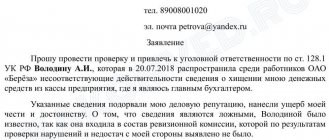The concept and types of slander - the difference between slander and insult and defamation
What is “slander”? This term means knowingly false (precisely false - not corresponding to reality!) and defamatory information or the dissemination of similar (false) information that can undermine the reputation of a citizen and discredit his honor and dignity.
In our country? In addition to civil liability, there is also criminal liability for libel.
Dissemination of deliberately false information of a defamatory nature includes:
- Publications in the media.
- Public demonstration.
- Posting information on the Global Network.
- Broadcast on radio and TV.
The subject of the crime, in this case, is recognized as a sane and capable citizen who has already reached 16 years of age.
- How does libel differ from defamation (note: dissemination of defamatory information in the media)? In essence, both of these are the dissemination in the media of information discrediting a citizen. But, unlike slander, defamation means not only false, but also true information.
- Difference from insult. It is worth noting here that an insult is a negative personal assessment of a citizen, which is expressed in an indecent form and is intended to humiliate the honor/dignity of a citizen. Whereas in the case of slander, the main point is the distortion of facts and their deliberate falsity. If a person disseminating false information of an offensive nature makes a conscientious mistake, he may be charged with insult.
Submission order
The complaint is filed directly at the police department or prosecutor's office. When applying to a judicial authority, you must submit an application to the office. If a law enforcement agency provides the opportunity to submit an appeal via the Internet, this can be done on the official website of the relevant department.
In any case, the receiving person must provide the applicant with a document confirming receipt. In the police this is a coupon; in the prosecutor's office, as a rule, the officer who received it makes a note on the second copy of the complaint, which remains with the author. The court issues a receipt indicating the documents transferred. If it is necessary to return them in the future, issuance without this paper cannot be made.
https://youtube.com/watch?v=v7x83I-51yE%3Ffeature%3Doembed
Qualification of the crime - what can be punished for libel?
According to judicial statistics, actual convictions for libel are very rare. For example, in 2010, out of 314 convicted, two went to jail; in 2014, 129 people were convicted under this article. In addition, four were charged with slander as an addition to the main crimes.
What is the threat to the slanderer?
Previously, according to Art. 129 of the Criminal Code, which became invalid in 2011, the slanderer was punished with compulsory labor and a fine, and in some cases with imprisonment (note - in qualifications).
Penalties today:
- For slander: a fine of up to 500,000 rubles, salary for a period of up to six months or up to 160 hours of mandatory work. Art. 128.1 CC.
- For “public” slander in the media, speeches or works: a fine of up to 1 million rubles, salary for a period of up to 1 year or up to 240 hours of work.
- For slander using an official position: a fine of up to 2 million rubles, salary for a period of up to 24 months or up to 320 hours of obligatory work.
- For slander about a certain disease of a citizen, which can be dangerous for everyone around him; or about a citizen committing a crime of a sexual nature: a fine of up to 3 million rubles, salary for a period of up to 3 years or up to 400 hours of mandatory work.
- For slander coupled with accusing a citizen of committing a serious crime: a fine of up to 5 million rubles, salary for a period of up to 3 years or up to 480 hours of obligatory work.
All persons who slander intentionally or for the sake of dubious pleasure should also remember that...
- In our country, the dignity of the individual is protected by the state (note - Article 21, Part 1 of the Constitution).
- Every citizen has the right to defend his good name and honor (note - Articles 23-24 of the Constitution).
- Damage caused to a citizen through slander is subject to compensation in accordance with the law (note - Article 19, Part 5 of the Civil Code).
- The honor, good name and business reputation of every citizen are protected by law as intangible benefits (note - Article 150 of the Civil Code).
- Causing moral harm through actions qualified as an encroachment on intangible benefits entails the obligation to pay compensation (note - Article 151 of the Civil Code).
- A citizen has every right to demand a refutation of slanderous information through the court if the slanderer does not have evidence that the disseminated information corresponds to reality (Article 152 of the Civil Code).
In reality (from practice), libel is usually punished with fines, the largest of which does not exceed 100,000 rubles.
Criminal liability
The liability implied for reporting knowingly false information is described in Article 128.1 “Slander” of the Criminal Code of the Russian Federation. Relatively recently, such cases were considered within the framework of civil proceedings.
Let's look at what sanctions can be applied to persons convicted under this article at the present time:
- For slander without additional characteristics, the convicted person is punished with a fine of five hundred thousand rubles or compulsory work in the amount of 160 hours. An example of such a crime is the disclosure of defamatory information orally or via electronic messages.
- Spreading rumors on a large scale threatens the violator with a fine of up to a million rubles or 240 hours of work. This category includes slander disseminated on television, radio or the Internet, on resources equivalent to the media.
- If slander is spread using the official position of the violator, he may face fines of up to 2 million rubles or labor service for up to 320 hours. For example, the head of an institution slanderes his former employee to the management of competitors, and this prevents the victim from finding a new job.
- If a person slanderes a non-existent dangerous disease of the victim, he faces punishment in the form of a fine of up to 3 million rubles or compulsory work of 400 hours. This part of the article implies the same punishment for misleading others that the victim has committed unlawful acts of a sexual nature.
- Dissemination of knowingly false information about the actions of the victim, which can be qualified as grave and especially grave crimes, is punishable in the most severe manner, provided for in Article 128.1 of the Criminal Code of the Russian Federation - a fine of up to 5 million rubles or 480 hours of work.
Fines are collected from the wages or other income of convicted persons within a certain period of time. The larger the fine, the more time the citizen is given to pay the amount of money.
It is worth noting that money can be recovered from the distributor of slander for moral damage caused or (if business reputation was damaged due to the dissemination of false information). To do this, it is necessary to attach the corresponding statement of claim to the case.
How to prove slander and punish the slanderer - instructions
Victory over a slanderer is a difficult matter, but (with the help of lawyers) quite realistic. True, only if there is reinforced concrete evidence. Without them, it is impossible to win the case.
The main premise of the defense in court is evidence of the direct intent of the slanderer . That is, it will be necessary to prove that the distributor was well aware of the falsity of the information being disseminated and consciously desired the consequences of its dissemination.
How to fight?
Instructions for victims of slander
- Don't rush into battle unless you have evidence. Don't waste your nerves and time in vain.
- Get the support of a lawyer. He will advise you on how to competently collect evidence, write a statement and defend yourself further.
- Collect evidence: paper documents certified by a notary, audio and video materials, and, if available, testimony of witnesses.
- Seek a psychological and linguistic examination of libel on the Internet and in the media. This examination will help determine whether the materials contain signs of slander. If available, the expert opinion can be attached to the application.
- Where to contact? If you are going to bring the slanderer to civil liability, then the statement, written strictly according to the form, should be written to the district court (if the court’s decision is negative, we go higher - to the world court). If it’s criminal, then go to the police. However, the possibility of simultaneously submitting applications to both authorities cannot be ruled out. It is also possible to consider the application at the Prosecutor's Office.
- In addition to the requirement for a refutation, a citizen has the right to demand compensation for moral damage (in both civil and criminal proceedings). The consequences of slander in the form of moral and physical suffering will also have to be proven. The final amount of compensation is determined solely by the court.
- Time limit for consideration of the case in court. From the date of submission of the application to the office, it is 1 month.
- The statute of limitations for this crime (libel) is 3 years. There is no statute of limitations for filing a claim for compensation for moral damages.
Where can I find a sample statement of libel in 2019?
As in the case of any other report of a crime, a statement to the police about slander is drawn up in any form - no special forms, forms or templates are provided for by the laws of the Russian Federation in this case. However, if you want your application to be completed correctly, we still advise you to adhere to the basic recommendations.
So, a statement of libel must contain the following information:
- Name of the territorial body of the Ministry of Internal Affairs to which the application is submitted;
- Last name, first name and patronymic of the victim;
- Contact details of the victim (residence address, contact phone number or email address);
- Circumstances of the incident (state in free form all the circumstances known to you, and if you know the alleged criminal, be sure to indicate all known information about him: full name, place of work, address, phone number, signs, etc.);
- List of witnesses (it is necessary to list their names, addresses and telephone numbers, and also indicate what information they can provide);
- List of attached evidence (for example, notarized screenshots of correspondence or a CD with an audio recording);
- Date of contact with the police.
Note ! If you doubt that you can write a statement of libel on your own, contact our lawyers for a free consultation.
Application consideration period
If an application is filed with the police, a decision on the application is made within three days. If the circumstances of the case are complex, the period is increased to 10 or 30 days. The statute of limitations applies to minor crimes. If the victim was slandered more than 2 years ago, he will not suffer any punishment.
If the case is filed in court, 7 days after registration of the application, the process is started (the alleged criminal is summoned to court, acquainted with the case, find out who else to call and hear as defense witnesses). There is no statute of limitations for cases brought to court. An exception is cases regarding information disseminated in the media (such cases have a statute of limitations of one year from the date of publication).
Contacting the prosecutor's office
The powers of the prosecutor's office include:
- verification of complaints against police officers who conducted investigations into slander, and analysis of the legality of the decisions made;
- approval of the indictment and support of the prosecution during the trial.
It is not advisable to submit an application for prosecution for the dissemination of false information discrediting the moral character of a citizen to the prosecutor's service.
The explanation is that prosecutors:
- do not take part in civil proceedings for compensation of damages;
- do not investigate notifications of violations;
- do not replace the police and the court, which are authorized to make decisions on the facts of individuals filing complaints of libel and punish criminals;
- do not monitor compliance with the law and are not empowered to take response measures against those responsible.
Prosecutor's officers accept statements from victims and forward them to the subordinate organization. No more than 5 days pass from the moment the document is registered. Therefore, to save time, it is better to contact the police station or court directly.







